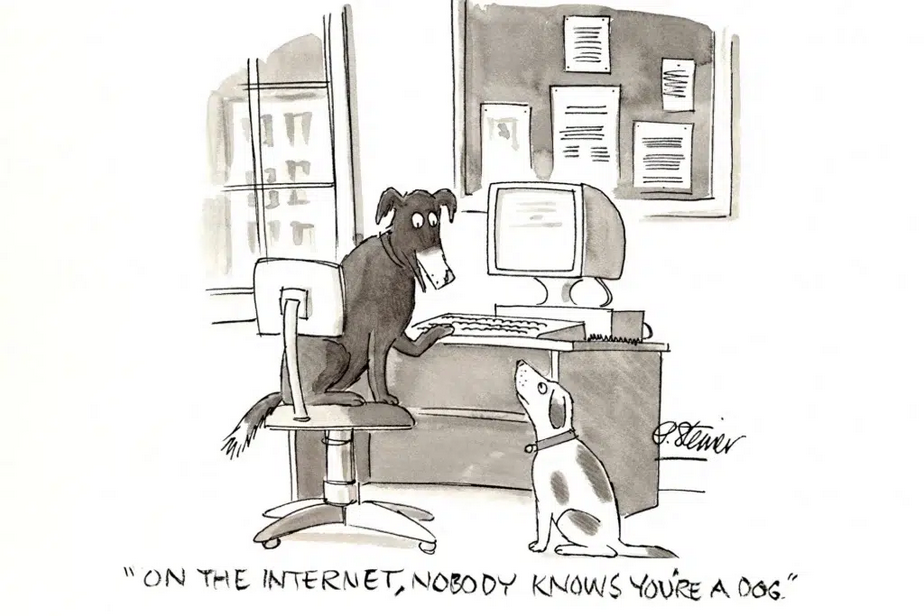blog date; 5/18/2025
on the internet, nobody knows you're a dog
When I was in middle school, whenever I would post something on my Facebook, rage comics or just reposts, the other kids in my class would find ways to berate me with them. I simply made a burner account and started posting there. When I realized that I could say and do whatever I wanted, the feeling of freedom was intoxicating, and my morals went out the window when I realized how funny it was to be a dick to people online. This led me into making burner accounts to harass my classmates. In my child mind, this was justified because they had done the same to me before.
Eventually my digital crusade of being-a-dick-to everyone-that-crossed-paths-with-me wasn't enough and I started to look for other people to be dicks with to others. This led me into finding out about 4chan and it's raid culture. Of course my valiant crusade wasn't without consequence, being a dumb child, I had no clue about what OPSEC or OSINT was. Needless to say I was almost doxxed and that experience alone was enough to age me 10 years in an instant.
After this, I stopped trolling random people and started to take my OPSEC like its srsbsns™. Over the years, I've wore the mask of many personas online. 80's divorced rock-dad, a lonely hikkikomori girl, a linux kernel developer, a chinese cybersec professional, a russian hacker, I even pretended to be a semi-famous game dev once and got away with it for a while. All for the lulz and just to see how far I could take it.
Of course having known what you can do with a false identity online first-hand, today I'll write this article for you to be careful about the people you talk to online, and to be careful about what you get yourself into online. Because I've had multiple people think I was someone else for 3 years simply because I thought it was funny. You can never know if you're talking to a genuine human being, a bot, or a degenerate online. (Emphasis on the degenerate part.)
the appeal and risks of online anonymity
The internet has always been a playground for people like me. Behind screens, people leave the ideals of their moral identities and try on new ones: like a tech-wizard in a space-fantasy realm, a sharp-tongued critic, a shitposter, a doxxer, a manipulator, or a nostalgic dad from the '80s. This fluidity—the power to become someone else, even for a moment, is part of what makes the internet so attractive in the first place. But with that power comes responsibility, and not everyone wields it with care.
At it's simplest, the internet allows people to experiment with personas they otherwise could not in real life. Free from accountability, people rip their morals off their skin and engage in all manners of debauchery and degeneracy. People start getting comfortable. They'll start saying things they couldn't even think to say in real life. Little Timmy, who was the sweetest boy in the neighborhood, is suddenly doxxing people because they talked shit at him in an online game. The lonely guy that had trouble dating in high school is suddenly into manospheres and is starting to develop harmful ideas about relationships and women. It's all a psychological phenomenon called the Online disinhibition effect; the removal of consequences leads to impulsive, aggressive, or manipulative behavior.
That’s how you get echo chambers, doxxing, raids, and troll culture. The same veil that protects the vulnerable can also shield the malicious. For some, anonymity isn't used to explore identity—it’s used to weaponize it. And sometimes the line is blurry. It might start as a joke or an ironic persona—pretending to be a developer, a veteran, a woman, a clown—but over time, even the person behind the mask can forget where the character ends and the self begins. LARPing can become lying. Satire can become deception.
the illusion of safety
Anonymity creates a false sense of security. People assume that if their username (or their real-life information) isn't tied to their activies, they're untouchable. This is simply not true.
A single fuck up is all it takes.
An old username, a reused photo, leaving out exif data- and suddenly, your whole web of activities or whatever it was you were up to is on a plaintext file that was sent to your school e-mail through a guerrila mail service.
Often, doxxing isn't done by ELITE RUSSIAN HACKERS™ or THE HACKER KNOWN AS 4CHAN™ but just by bored teenagers that watched a 10 minute long YouTube video on OSINT 101. As I've stated, all it takes is one fuck-up to be a target to a bored 16 year old script kiddie. I know because I've been on both ends of this stick. In this sense, anonymity is both an armor and a trap, depending on how you use it.
be anonymous responsibly
So where does that leave us?
Anonymity isn't inherently bad, but like a power tool in your grandpa's garage, it demands proper handling and care, lest you cut off someone's or your own finger clean off. It's one thing to use anonymity to LARP as something, and it's something else entirely to let your own façade mold your being like clay, to let the echo chambers and the bullshit culture stain your very essence and morals.
If you're going to be anonymous, you might want to ask yourself; "Would I do/say this in real life?" or; "Could I get away with this?" Either choice is up to you, but the outcome of either choice will be the energy you'll be sending out into the world. Remember that the people you'll help and the people you'll ruin will get off their screens and change the world around them with the energy you've given to them.
This goes for you as well. Don't stare at your screen for too long.
